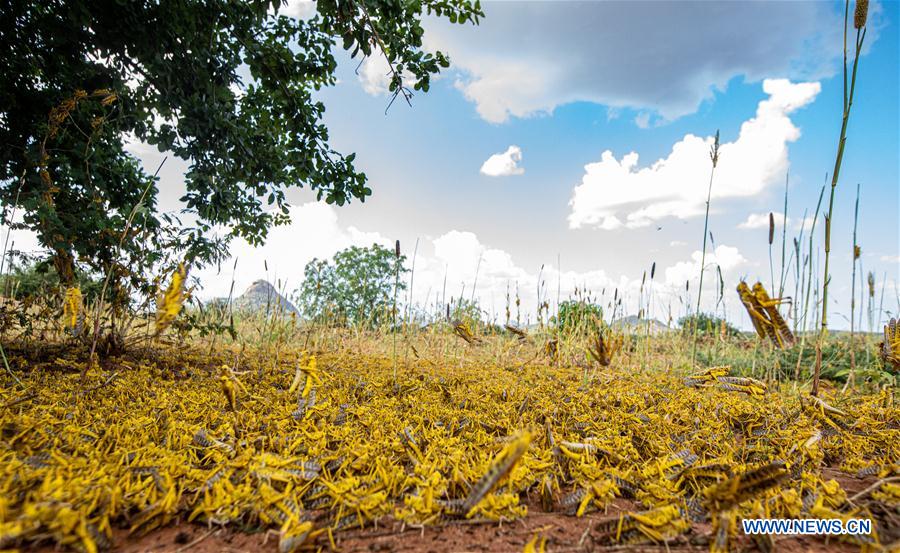
A swarm of desert locusts invade parts of Mwingi Town in Kitui County, Kenya, Feb. 20, 2020. Extreme weather events due to the climate crisis are becoming the new normal in the Horn of Africa (HoA) as recent heavy rains and cyclonic activity resulted in a desert locust upsurge that has affected countries in the region and beyond, the United Nations Office for the Coordination of Humanitarian Affairs (UNOCHA) has stressed. (Xinhua/Zhang Yu)
ADDIS ABABA, Feb. 20 (Xinhua) -- Extreme weather events due to the climate crisis are becoming the new normal in the Horn of Africa (HoA) as recent heavy rains and cyclonic activity resulted in a desert locust upsurge that has affected countries in the region and beyond, the United Nations Office for the Coordination of Humanitarian Affairs (UNOCHA) has stressed.
Noting that climate crisis-inflicted extreme weather events "are becoming the new normal in the Horn of Africa region," the UNOCHA in its latest humanitarian update issued on Thursday stressed that back-to-back droughts and floods in 2019 have led to rising needs and compounded the humanitarian consequences of conflict and violence across countries in the region.
"Just two years after the 2016/2017 drought and one year after flooding in 2018, back-to-back droughts and floods in 2019 have led to rising needs and compounded the humanitarian consequences of conflict and violence in multiple locations," the UNOCHA statement read.
According to the UNOCHA, in addition to the loss of lives, livestock and crops, as well as population displacement, the above-normal rains and cyclonic activity in late-2019 and early-2020 have contributed to a desert locust upsurge that has affected countries including Djibouti, Eritrea, Ethiopia, Kenya, Somalia.
"Of the 24.1 million severely food insecure people across the Greater Horn of Africa, an estimated 9.75 million are living in areas affected by desert locusts in Ethiopia, Kenya and Somalia," the statement read.
Describing the desert locust as "the most dangerous migratory pest in the world," it also warned that the desert locust is "expected to continue to breed and spread in the coming months, coinciding with the start of the next planting season."
It also stressed that "without urgent effective control measures, the locusts could severely impact the food insecurity of households already struggling to cope with multiple shocks."
The latest call by the UNOCHA also came a day after the UN Food and Agriculture Organization (FAO) warned over serious food security and livelihoods threat inflicted by "widespread desert locust infestations and a new generation of breeding in the region as the situation remains extremely alarming in Kenya, Ethiopia, and Somalia."



